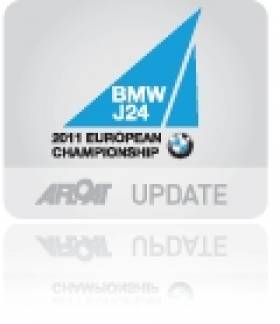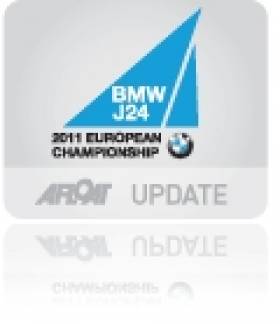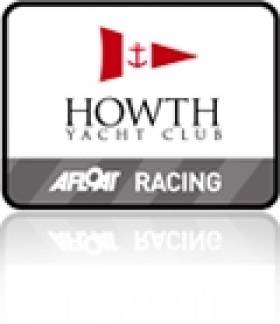Displaying items by tag: BMW
#rsgyc –One novel addition to this weekend's Royal St George Frank Keane BMW George Regatta, one of the biggest club regattas of the year, is the "Try Sailing" initiative which allows non sailors, family members or first timers to get out on the water in the Club 1720s. Life jackets will be provided and the idea is that it should be a fun half hour or so in a sailing boat with a qualified Club instructor in charge.
In addition the RSGYC White Sails & Non–Spinnaker Team Challenge is a new event run over three days to include the racing in the Regatta on Saturday. See details downloadable below. This is an event designed by the White Sails Class to encourage a sociable, time friendly, event with a mixture of competitive and fun sailing. Emphasis is as much on the activities ashore as well as those on the water.
Posters for the TWO events happening in RSGYC this weekend are downloadable below as PDF files.
Penfold Wins J24 Euro Title in Last Race Decider
Top of the table was 'Reloaded' (Mark Penfold), sailing under US colours, with 34 points, three ahead of the leading European entry 'Il Riccio' (Ian Southworth/Chris McLaughlin) which takes the European Championship trophy.
With the exception of their discard of a 20th in the fifth race, 'Reloaded' was consistently in the top four in most races and had one bullet, while closest rivals 'Il Riccio' had two bullets and only a 9th to discard.
That they had some 28 points to spare over the third placed 'Serco' (Bob Turner) emphasised their dominance over the series. The German champion 'Rotoman' (Kai Mares) was only a point behind in 4th place and won the final race of the regatta while Stuart Jardine, the oldest helm in the championship, had the distinction of winning three races, including the first two races of the final day. Another German boat 'Hungriger Wolf' (Johann Huhn) had six top ten results to earn 6th overall.
Local boat Jibberish (O'Kelly/Wormald/Walsh) enjoyed its best result when finishing second behind 'Stouche' (Jardine) in the seventh race while German entry 'JJone' (Frithjof Schade) was looking at the same transom in the eighth race. The Southworth/McLaughlin crew topped the fleet in the penultimate race followed by the Hungarian boat 'Naviscon' (Farkas Litkey) while 'Serco' took second behind 'Rotoman' in the final race.
Needing to beat their US rivals by several places in the last race to take 1st overall, 'Il Riccio' could only manage an 8th to 'Reloaded's' 5th.
The leading Irish crew was 'Hard on Port' (Flor O'Driscoll, HYC) in 10th overall with 'Jamais Encore' (John-Patrick McCaldin, Lough Erne YC) next best in 17th.
J24 Euros Open in Howth, Strong Winds Cancel Practise Race
The BMW J/24 European Championships were officially opened last night with a ceremony on the forecourt in front of the Howth Yacht Club clubhouse on the podium erected by the sponsor but a practise race scheduled for this afternoon was cancelled due to strong winds.
Last night's openning ceremony featured two top-of-the range BMW vehicles and a motorcycle and a backdrop with the highly appropriate phrase of 'Joy is Plain Sailing' in front of the national flags of the nine competing nations.
With an audience of competitors, supporters and club members, the speakers on the podium were introduced by the 'Master of Ceremonies', Club and Championship Press Officer Graham Smith.
First to speak was Derek Bothwell, Chairman of the Championship Organising Committee, and then the Commodore Roger Cagney addressed the large crowd who has assembled on the forecourt and balcony. They were followed by John Ives, Managing Director of BMW Ireland, the title sponsors, who spoke about BMW's global involvement in sailing, and then Niamh McCutcheon, President of the Irish Sailing Association, spoke on behalf of the ISA and the Irish Sports Council who supported the event.
Jim Farmer, President of the World Council of the International J/24 Class Association, spoke next, and the final speaker was the Mayor of Fingal, Cllr.Gerry McGuire, who welcomed all the overseas visitors to the county and officially declared the Championship open.
BMW to sponsor J/24 Europeans at Howth
Howth Yacht Club has announced that BMW Ireland is to be the title sponsor of the J/24 European Championship at Howth next September when up to forty boats from six countries are expected to compete.
One of the major regattas in Ireland this year, the BMW J/24 Europeans has already attracted interest from J/24 sailors in the UK, Holland, Sweden, Monaco, Italy, Germany and Greece. Racing will take place over four days (Sept.12th-15th), and will be preceded by registration, measurement and practice from the 9th. The Principal Race Officer will be ISAF International Race Officer David Lovegrove while Bob Milner (UK) will chair the International Jury.
The J/24 is the biggest and most widespread one-design keelboat class in the world with fleets in 32 countries and is sailed in half a dozen bases in Ireland.
“We are delighted that a brand of the stature of BMW has agreed to support what is one of the most prestigious events on Irish waters in recent years,” said Derek Bothwell, Chairman of the organising committee.
John Ives, Managing Director of BMW Ireland, added: “Sailing is a sport which combines dynamics, competitiveness and the ‘joy of freedom’ in the most beautiful way. We at BMW associate our brand with these attributes and are thus proud to support major sailing events all over the world. In Ireland, we are now also particularly happy to be associated with the J/24 European Championships.”
Howth Yacht Club has previously hosted six World and European Championships in the past, testimony to its ability to host major regattas. The BMW J/24 Europeans is the biggest event in a programme of 22 local, national and international events being staged by the club in 2011.


























































